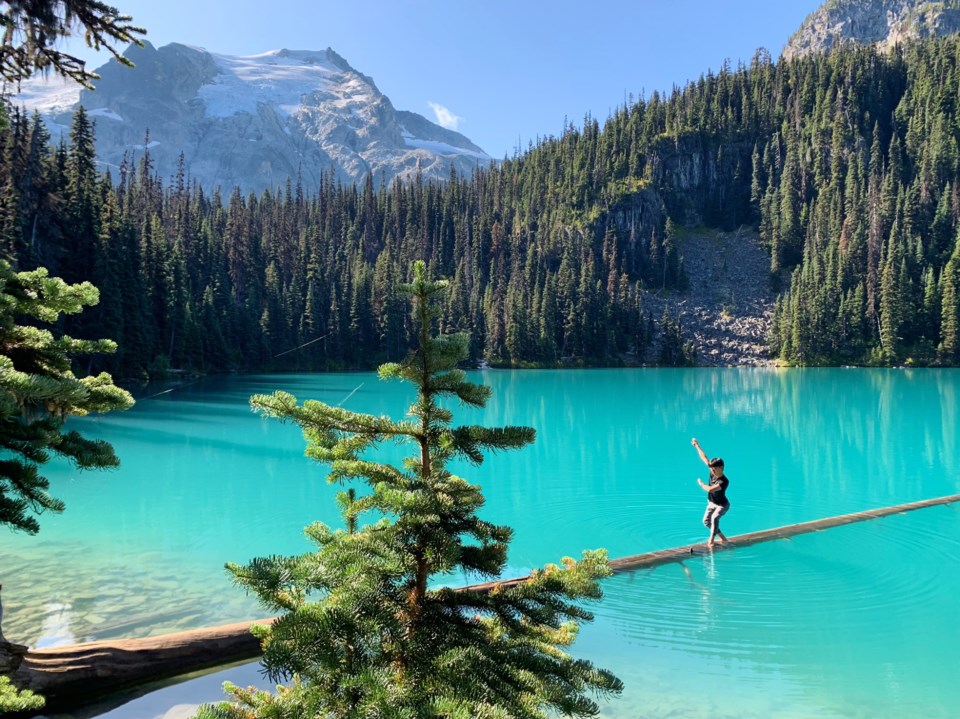A partnership approach from BC Parks, Lil’wat Nation and N’Quatqua will see closures introduced for Joffre Lakes this summer. The Ministry of Environment and Climate Change Strategy, Ministry of Indigenous Relations and Reconciliation, Lil’wat Nation and N’Quatqua released a joint statement on April 25 detailing the new rules.
The First Nations and province said they want to strike a balance between supporting the growing number of visitors and “sustainably conserving the natural and cultural values that make the land special."
The park, known as ‘Pipi7íyekew,’ is collaboratively managed by Lil’wat Nation and N’Quatqua. They said the primary goal is maintaining the park’s natural environmental state. It will now be managed to protect Indigenous cultural values or nt’ákmen (our ways), resource protection and public safety. In 2019, the park reached an all-time high of 196,300 visitors, an increase of 222% since 2010. It has become one of busiest parks in the province.
Joffre Lakes and the wider Duffey corridor are a “banquet place” where minerals and plants can be gathered, berries harvested, animals such as mountain goat and deer hunted, mammals trapped, and fish caught. The 2024 operations plan for the park will give the First Nations time and space to exercise their rights. The park will continue to allow for day-use and camping this summer while making sure the area is protected for generations to come.
Closure dates include:
- April 30 until May 15, to support Indigenous-led cultural celebrations, including Stl’atl’imx Days, a celebration of the Declaration of the Lillooet Tribe on May 10, 1911.
- June 14 to 23, to support summer solstice and Indigenous Peoples Day celebrations.
- Sept. 3 until Oct. 6, to support Indigenous fall harvesting practices and the National Day for Truth and Reconciliation.
Public access to the park begins May 16. BC Parks will continue the free, day-use pass program at Pipi7íyekw/Joffre Lakes Park that began in 2020. Adults and youth, 12 and older, will need to reserve a free day-use pass to visit the park. The free passes ensure there is adequate and safe parking, and provide visitors a more enjoyable experience by reducing congested trails.
Five hundred free day-use passes will be up for grabs this summer, and 26 tent pads will be available each day. The day-use passes are available for reservation at 7 a.m., two days before a planned visit. Camping can be booked up to four months in advance of arrival.
Chief Dean Nelson of Lil’wat Nation said this summer will be a step in the right direction.
“Pipi7íyekw has been a sacred place for our community since time immemorial, providing sustenance and cultural value, integral to our livelihood,” he said in the release. “By implementing these closures, we are striving to reintroduce our community to an area where they have been marginalized. The time and space created by these closures will allow our youth, elders and all Lil’wat citizens to practise their inherent rights while reconnecting with the land. The Province’s commitment to listening and collaborating under the shared goals under the Visitor Use Management Strategy, demonstrates a true step in our shared journey of reconciliation."
George Heyman, Minister of Environment and Climate Change Strategy acknowledged the impact increased visitors are having on the place of natural beauty.
”British Columbians understand this land has been First Nations territory for thousands of years,” he said. “As more and more people arrive to enjoy the incredible beauty of Pipi7íyekw/Joffre Lakes Park, there is an impacting result on the environment. We have deep appreciation for the collaboration that has gone into welcoming visitors to the park from summer to Labour Day long weekend, while ensuring First Nations communities have the time and space to connect with the land, their culture and traditions in a meaningful way.”
Chief Micah of N’Quatqua said protecting the Nation's territory has always been its focus.
“The land that we walk on, the waters we drink, the mountains where we hunt. All of these were taken care of by our ancestors,” he said. “Now it is our duty to take care of them for the future generations, so they have the same beauty that we do. By closing Joffre for the times we chose, gives the land a break, a time to rejuvenate, to heal. It is a very special place; the world comes to see it, we need to keep it beautiful. Our ancestors left to us to protect, we shall remain.”



